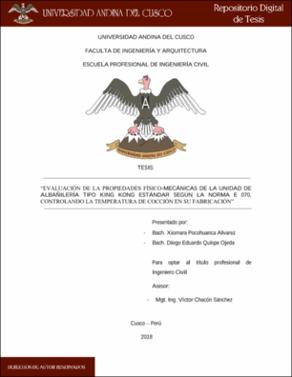| dc.contributor.advisor | Chacón Sánchez, Víctor | |
| dc.contributor.author | Pocohuanca Alvarez, Xiomara | |
| dc.contributor.author | Quispe Ojeda, Diego Eduardo | |
| dc.date.accessioned | 2018-10-31T14:56:29Z | |
| dc.date.available | 2018-10-31T14:56:29Z | |
| dc.date.issued | 2018-08-16 | |
| dc.identifier.uri | https://hdl.handle.net/20.500.12557/1958 | |
| dc.description.abstract | La presente investigación está referida al estudio de las propiedades físico-mecánicas de
las unidades de albañilería tipo King Kong Estándar variando la temperatura de cocción.
Para la elaboración de muestras, ensayos y análisis de los datos se emplearon normas técnicas peruanas (NTP) referido al mortero, unidades y pilas de albañilería, y para la
cocción usamos los parámetros de las tesis referidas en los Antecedentes. Las unidades
de estudio fueron ladrillos King Kong estándar de 18 huecos, con una dimensión de 24cm x 12cm x 9cm, se coccionó un total de 172 unidades a 800°C y 900°C de las cuales se tomaron 72 para la elaboración de pilas, el mortero se elaboró con relación agua-cemento de 1:05 y con un espesor de junta de 1.5 cm. Observando los resultados
obtenidos, se tiene mayor variación dimensional a 900°C, mayor alabeo a 800°C, mayor
absorción a 800°C, mayor succión a 800°C, la mayor resistencia a compresión fue de
101.83 kg/cm2 que corresponde a la unidad coccionada a 900°C y la mayor resistencia a
compresión en pilas fue de 66.50 kg/cm2 que corresponde a las unidades coccionadas a
900°C. Se concluyó que las unidades coccionadas a 900°C son ladrillos tipo II y los ladrillos coccionados a 800°C son ladrillos tipo I. | es_PE |
| dc.description.abstract | The present investigation is referred to the study of the physical-mechanical properties
of standard King Kong masonry units, varying the cooking temperature. For the elaboration of samples, tests and analysis of the data referring to the mortar, units and
piles of masonry, Peruvian technical standards (NTP) were used, and for the cooking we
used the parameters of the referred thesis. The study units were standard King Kong bricks of 18 holes, with a dimension of 24cm x 12cm x 9cm, a total of 172 units were
baked at 800 ° C and 900 ° C, of which 72 were taken for the production of batteries.
The mortar was prepared with a water-cement ratio of 1:05 and a joint thickness of 1.5
cm. Observing the results obtained, there is greater dimensional variation at 900 ° C, higher warpage at 800 ° C, higher absorption at 800 ° C, higher suction at 800 ° C. The
highest resistance to compression was 101.83 kg / cm2, which corresponds to the unit
cooked at 900 ° C and the highest resistance to compression in piles was 66.50 kg / cm2, which corresponds to the units cooked at 900 ° C. It was concluded that the units
baked at 900 ° C are type II bricks and the bricks baked at 800 ° C are type I bricks. | en_US |
| dc.description.uri | Tesis | es_PE |
| dc.format | application/pdf | es_PE |
| dc.language.iso | spa | es_PE |
| dc.publisher | Universidad Andina del Cusco | es_PE |
| dc.rights | info:eu-repo/semantics/restrictedAccess | es_PE |
| dc.source | Universidad Andina del Cusco | es_PE |
| dc.source | Repositorio Institucional - UAC | es_PE |
| dc.subject | Albañilería | es_PE |
| dc.subject | Alabeo | es_PE |
| dc.subject | Succión | es_PE |
| dc.subject | Absorción | es_PE |
| dc.subject | Resistencia | es_PE |
| dc.subject | Compresión | es_PE |
| dc.subject | Mortero | es_PE |
| dc.subject | Temperatura | es_PE |
| dc.title | Evaluación de la propiedades físico-mecánicas de la unidad de albañilería tipo king kong estándar según la norma e 070, controlando la temperatura de cocción en su fabricación. | es_PE |
| dc.type | info:eu-repo/semantics/bachelorThesis | es_PE |
| thesis.degree.name | Ingeniero Civil | es_PE |
| thesis.degree.grantor | Universidad Andina del Cusco. Facultad de Ingeniería y Arquitectura | es_PE |
| thesis.degree.level | Titulo Profesional | es_PE |
| thesis.degree.discipline | Ingeniería Civil | es_PE |

